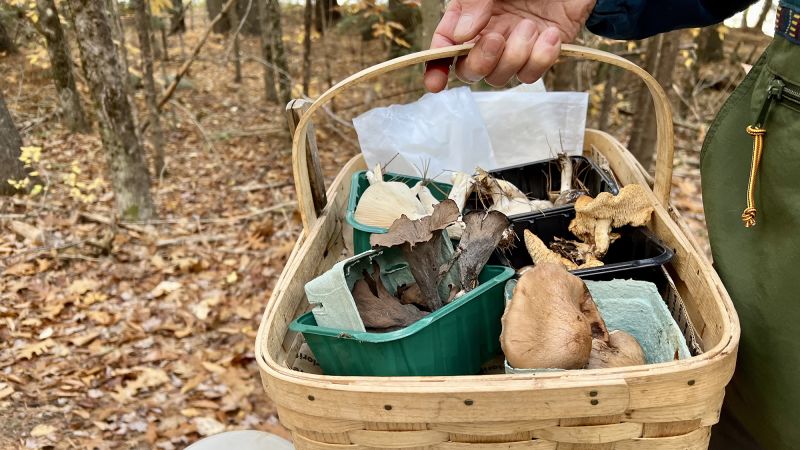- cross-posted to:
- health@lemmy.world
- cross-posted to:
- health@lemmy.world
…
People have been foraging for mushrooms since the Stone Age, but mycologists across the country say they’ve seen an increased interest in the hobby and a significant increase in poisonings, too.
“Fungi are kind of a hot thing right now,” said Dr. Matthew Nelsen, a research scientist at the Negaunee Integrative Research Center at the Field Museum in Chicago who is also president of the Illinois Mycological Association, a group that describes itself as “fungal enthusiasts.”
Mushroom motifs now decorate all kinds of things: tea towels, toddlers’ sweaters, table lamps. But when interest extends beyond mushroom stuffies to the real stuff, people really need to be careful.
…
Even experts can have a hard time telling the toxic from the edible just by sight, mycology instructor Rick Van de Poll said. He has to examine some of them under the microscope to be sure they’re safe.
There are old mushroom hunters and there are bold mushroom hunters but there are no old, bold mushroom hunters.
Seriously, If you don’t know or are unsure, find someone who is knowledgeable and learn the commonly found deadly poisonous mushrooms in your area before you even collect mushrooms. Only start with good edibles that are easy to identify - there are many. Some like the Parasol mushroom should be left to seasoned mushroom hunters. At the very least you should get the “Seek” app for your phone but don’t bet your life on it. Death by a Destroying Angel or Deadly Galerina is a horrible way to go.- All fungi are edible.
- Some fungi are not edible more than once.
Hey if you have your seconds right away it is more then once
Typical scaremongering article—eating wild mushrooms is perfectly safe if you are willing to learn basic information about what you’re doing. The vast majority of people poisoned, like the man in the article, are those who made virtually no attempt to identify the mushrooms in question. Destroying angels and giant puffballs are radically different in appearance which would be revealed within 30 seconds of reading or viewing images online.
Regarding the microscope thing—sure, some species require a microscope to ID. As with all organisms, some closely related species can appear extremely similar. But I’m not aware of any commonly consumed species that can only be separated from poisonous lookalikes using a microscope. Most mushrooms people eat, like the giant puffball, can be reliably identified by novices with a few minutes of education and practice.
That said, obviously don’t eat something just because an app said maybe it’s something you can. That is moronic. Cool tattoo though.
Jesus Christ they mistook a destroying angel for a puffball. A simple ass Google search could tell have prevented this
More people are foraging because they can’t afford what’s at the grocery store. Hell I harvest stinging nettle to replace spinach.
Lots of wild forageable mushrooms that can’t be bought at the store either
eating the wrong mushrooms even a tiny amount will not only kill you, but it will be slow and painful
Up here in the Northwest USA, mushroom hunting has been a passtime for folks for decades.
It’s so popular out here that local mushroom companies have begun cultivating varieties that used to be only available to people who hunted in the woods for them.
You don’t have to go into the woods anymore for shit like chanterelles. They’ve had that shit at Safeway for a few years now.
i remember about 20-25 years ago when Cowboy Bebop came out, they had a episode about them tripping mushrooms, which had a fantastic song as part of that episode’s soundtrack, called Mushroom Hunting.
Yoko Kanno and the Seatbelts fucking rocked.
also, i could totally go for some shrooms.
Probably one of the best episodes of the series, imho.
They’re really easy to grow. I mean, not that I would know….
“fungal enthusiasts.”
sounds like my ex
Funguthiasts
I wish more people would take up an interest in cultivation of mushrooms. Some of them, like most oyster strains, are dead simple. You can grow them on old shipping boxes or kids’ homework. Anything derived from wood, they don’t care.
Much lower risk of harm and a great way to recycle paper goods into edible protein. And any size will do! Want a ton? Use 5 gallon buckets with holes drilled on the sides. Want a small amount? Seed a 2 liter bottle and pop the whole thing out into a bucket to fruit.
Other species, like log growers, will produce 3-10x/yr for years (5-10+ years depending on species and log) with zero effort other than maintaining moisture/humidity, once the log is set up in a space like an old aquarium with cracked glass - knock out the panel and install screen to use it for ventilation. It’s just a matter of sourcing the right log, a busted aquarium of the right dimensions (typically free) and some spores or seed substrate.
And the leftover mycelium is great in gardens as compost, and you might get a bonus mushroom here or there from it! Decomposers tend to work very nicely with food crops.











